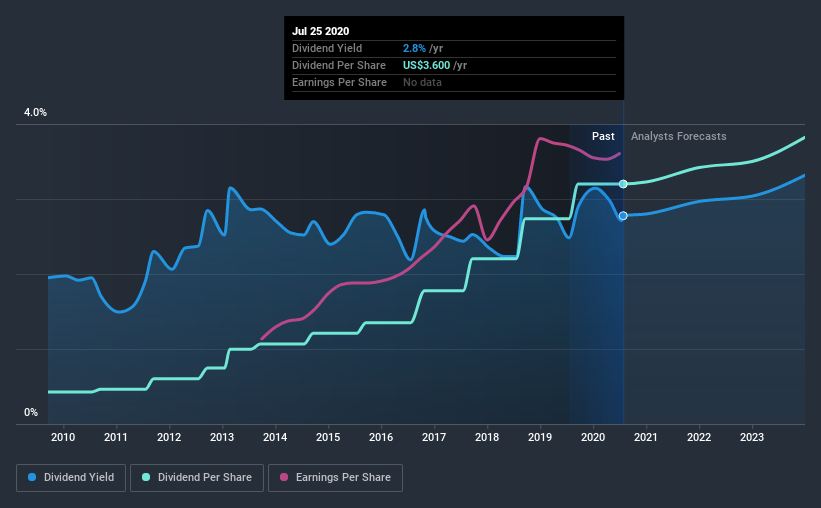Only Three Days Left To Cash In On Texas Instruments' (NASDAQ:TXN) Dividend

Regular readers will know that we love our dividends at Simply Wall St, which is why it's exciting to see Texas Instruments Incorporated (NASDAQ:TXN) is about to trade ex-dividend in the next 3 days. Investors can purchase shares before the 30th of July in order to be eligible for this dividend, which will be paid on the 17th of August.
Texas Instruments's next dividend payment will be US$0.90 per share, and in the last 12 months, the company paid a total of US$3.60 per share. Looking at the last 12 months of distributions, Texas Instruments has a trailing yield of approximately 2.8% on its current stock price of $129.63. Dividends are an important source of income to many shareholders, but the health of the business is crucial to maintaining those dividends. As a result, readers should always check whether Texas Instruments has been able to grow its dividends, or if the dividend might be cut.
View our latest analysis for Texas Instruments
Dividends are typically paid out of company income, so if a company pays out more than it earned, its dividend is usually at a higher risk of being cut. Texas Instruments is paying out an acceptable 64% of its profit, a common payout level among most companies. A useful secondary check can be to evaluate whether Texas Instruments generated enough free cash flow to afford its dividend. It paid out more than half (56%) of its free cash flow in the past year, which is within an average range for most companies.
It's positive to see that Texas Instruments's dividend is covered by both profits and cash flow, since this is generally a sign that the dividend is sustainable, and a lower payout ratio usually suggests a greater margin of safety before the dividend gets cut.
Click here to see the company's payout ratio, plus analyst estimates of its future dividends.
Have Earnings And Dividends Been Growing?
Businesses with strong growth prospects usually make the best dividend payers, because it's easier to grow dividends when earnings per share are improving. Investors love dividends, so if earnings fall and the dividend is reduced, expect a stock to be sold off heavily at the same time. Fortunately for readers, Texas Instruments's earnings per share have been growing at 16% a year for the past five years. Texas Instruments has an average payout ratio which suggests a balance between growing earnings and rewarding shareholders. Given the quick rate of earnings per share growth and current level of payout, there may be a chance of further dividend increases in the future.
Many investors will assess a company's dividend performance by evaluating how much the dividend payments have changed over time. Texas Instruments has delivered 22% dividend growth per year on average over the past 10 years. It's exciting to see that both earnings and dividends per share have grown rapidly over the past few years.
The Bottom Line
Has Texas Instruments got what it takes to maintain its dividend payments? Higher earnings per share generally lead to higher dividends from dividend-paying stocks over the long run. However, we'd also note that Texas Instruments is paying out more than half of its earnings and cash flow as profits, which could limit the dividend growth if earnings growth slows. It might be worth researching if the company is reinvesting in growth projects that could grow earnings and dividends in the future, but for now we're not all that optimistic on its dividend prospects.
In light of that, while Texas Instruments has an appealing dividend, it's worth knowing the risks involved with this stock. Our analysis shows 1 warning sign for Texas Instruments and you should be aware of this before buying any shares.
A common investment mistake is buying the first interesting stock you see. Here you can find a list of promising dividend stocks with a greater than 2% yield and an upcoming dividend.
This article by Simply Wall St is general in nature. It does not constitute a recommendation to buy or sell any stock, and does not take account of your objectives, or your financial situation. We aim to bring you long-term focused analysis driven by fundamental data. Note that our analysis may not factor in the latest price-sensitive company announcements or qualitative material. Simply Wall St has no position in any stocks mentioned.
Have feedback on this article? Concerned about the content? Get in touch with us directly. Alternatively, email editorial-team@simplywallst.com.

